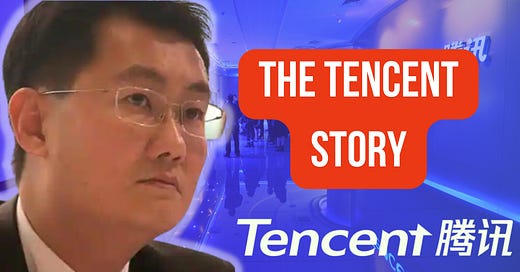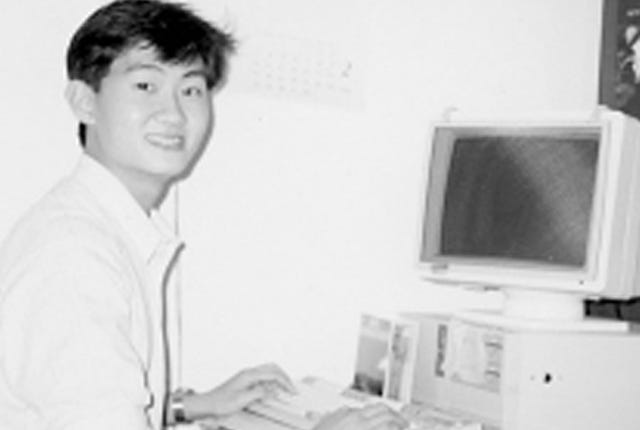The Tencent Story (Part 1 of 3)
Hello investors, welcome to my Substack, where I study the best Investors and businesses from around the world. In this week’s article, we’ll go over The Tencent Story. This is a three part series since I wasn’t able to fit the rich history of Tencent in just one article. This first article will cover the Early Days of Tencent. Before I start, I want to make a quick note, Poly Ma’s real name is Ma Huateng, but for the sake of ease, I’ll be using Pony Ma throughout these articles on Tencent.
The Early Days of Tencent and Pony Ma
Pony Ma's life, family, and education before founding Tencent had a significant impact on his career and the company's growth.
Pony Ma was born in 1971 into a middle-class family. Pony Ma spent his childhood in Hainan Province, where both of his parents worked at the local bureau of China's Maritime Safety Administration. Ma Chenshu, a native of Chaoshan, Guangdong, rose through the ranks of the bureau, from accountant to deputy chief. Pony Ma's older sister, Ma Jiannan, is four years his senior. Ma's parents tried to give their children a good education with science magazines and books when Hainan Province was a vast rural area literally cut off from the Chinese mainland. Thanks to those science books, Ma is said to have developed a strong interest in astronomy. In fact, with his billions now, he might enter into the billionaire space race club.
Ma Chenshu began working as the head of the accounting department at the Shenzhen Oceanus Group—the first ferry-service operator in Shenzhen—in 1984, when the family relocated to Mainland China near the Hong Kong border. Shenzhen had been a special economic zone (SEZ) for four years at the time, and the city had experienced rapid growth as an import and export hub.
Ma Chenshu rose through the ranks of Shenzhen Yantian Port Group, a state-owned logistics and supply chain company, to become vice president and a member of the board of directors in 1997. Pony Ma attended Shenzhen Middle School after his family relocated to Shenzhen, where he met Chen Yidan, Zhang Zhidong, and Xu Chenye, all of whom would later become co-founders of Tencent.
Ma Jiannan, his sister, would go on to work for Shenzhen Telecom, which could help him connect with government telecom and Internet personnel. Ma was also influenced by her time at college. By integrating Internet and information technologies into their ministerial networks, the Ministry of Education and the Ministry of Culture played an active role in the construction of China's information superhighway. As a result, disciplines like computer science, electronic engineering, and other related subjects became the most popular choices for Chinese college students. Pony Ma and his buddies were no different.
Ma returned to Shenzhen University in 1989, where he was reunited with Zhang and Xu, all of whom were computer science majors in the electrical engineering department. Ma and Xu shared a room.
Chen Yidan, a middle school friend, attended the same college and majored in chemistry. Ma's time at Shenzhen University was transformative, as he not only formed strong bonds with these individuals, but he also discovered and nurtured a passion for computer programming. It was also at a time when the country was in desperate need of Information Communication Technology talent. Ma started working as a software engineer at Runxun, a telecommunications company that specialized in paging services at the time.
Ma was a whiz when it came to math. He had high enough college entrance exam scores to attend any university in the country, but he chose to stay close to home and attend Shenzhen University. Ma's first choice, astronomy, was not available at the school, so he settled for his second best option: computer science. He was definitely a gifted individual.
Ma won student hacking competitions on a regular basis, and he pioneered the use of graphical user interfaces in China before they became popular. Ma built a stock market analysis tool with a GUI as a side project while interning at one of China's leading tech companies, and sold it to his boss for 50,000 Chinese Yuan or $7,839 US Dollars, which was three years' salary at that time. Ma worked for five years after college at a pager company, where he was exposed to cutting-edge technology and rose to the position of manager.
Ma, was living a double life in the early days of online chat rooms. He became a member of the burgeoning FidoNet community, participating in and later hosting early internet bulletin board systems, where he met future billionaires such as Xiaomi's Lei Jun and NetEase's Ding Lei.
During his time at Runxun, Ma spent a lot of his free time on CFido, the Chinese FidoNet, a self-organized bulletin-board system run by a group of Chinese computer and software experts, where fans and experts talked about software development and technical solutions, among other things.
Many of these individuals went on to become industry leaders. Ma became enthralled by the prospect of interacting with other computer enthusiasts and created his own CFido account, Ponysoft. Pony Ma made many friends on CFido who later became big names in China's high-tech and Internet industries. They formed a strong bond. Ding Lei, the founder and CEO of NetEase, also known by the domain name 163.com, was one of these people.
Ding was one of Ma's good friends with whom he drank beer and shared ups and downs in the early stages of their businesses. The success of Ding's 163.com had a huge influence on Ma's decision to start his own business.
Ma's growth as a computer engineer and entrepreneur was aided by the social and cultural environment of Shenzhen, his family, and his college education, which led to the idea of starting a business. In a more recent account of Tencent, Wu Xiaobo cited the anecdote that the company's name, Teng Xun in Mandarin, was derived from a combination of Ma's name "Teng" and the previous company he worked for, "Xun."
Tencent was founded as Shenzhen Tencent Computer Systems Co. Ltd. in November 1998. Pony Ma, Zhang Zhidong, Xu Chenye, Chen Yidan, and Zeng Liqing were the five core founders. Ma, Zhang, Xu, and Chen were all schoolmates and friends who had known each other since middle school.
Zeng and Ma's sister worked at Shenzhen Telecom together. Zeng was in charge of sales and marketing at Tencent, while the other four worked on developing computer programs and products. Back then, the government required $60,386 in registered capital to start a business. These five young men pooled their resources and each contributed a portion of the seed money.
The company, like many others in its early stages, lacked direction until it began developing an instant messaging system. IM was a unique communication format that predated the concept of real-time interactive conversation - an early successful prototype came in 1996 with the release of the software ICQ by the Israeli company Mirabilis. Mirabilis was acquired by AOL, the then-US Internet behemoth, in June 1998, with 21 million users. Then Tencent brought ICQ to China under the name OICQ in August 1998.
Due to their high cost, personal computers and household Internet were not widely available in China in the late 1990s. For online activities, the urban working classes mostly went to Internet cafes and net bars, where the owners ran dozens of computer terminals, paid Internet service providers, and charged users based on how much time they spent online. Users' primary concerns in such an environment were connection speed and the security of personal information. Tencent improved OICQ by compressing the software package's size so that users would download it quickly and store their contacts in their online accounts rather than on public computers.
Tencent became one of the first IM providers in China when OICQ was launched in February 1999. Within six months, the number of registered users had grown to over one million. This laid the groundwork for its future success in value-added Internet and mobile services.
This concludes the first part of the Tencent Story. If you’re interested in a further deep dive, I'll leave a link below links to my sources, namely - The Acquired podcast, Not Boring by Packy McCormick, and Tencent the book by Min Tang, and the book - Tencent - Survivor, Challenger And Leader from Wu Xiaobo.
Thank you for reading this article entirely till the end. Nothing helps me out more than y’all sticking it out till the end. Please consider subscribing to my substack if you haven’t already done so. Also if you enjoyed this article please like this article and subscribe to my substack so that I can continue to make articles like this for you to enjoy.



